January 15, 2021
Three's Company: New Research Reveals Data About Gay Men in Open Relationships
Matthew Wexler READ TIME: 3 MIN.
From marriage and family therapists to celebrities like Tom Ford and Alan Cumming, everybody has an opinion about monogamy. A new study highlights the variables that make (or break) a successful relationship.
A new report released by the Gay Therapy Center reveals that 30 percent of gay men are in open relationships. In December 2020, the survey polled 517 gay men, highlighting the variables that make (or break) a successful relationship.
Data indicated that 42% percent of the respondents in open relationships disclose all or most of their sexual contacts with their primary partners. Thirty-three percent have a "don't ask, don't tell" policy.
"I have concerns about the men in "don't ask, don't tell" open relationships," says Adam Blum, MFT, a psychotherapist and the founder and director of the Gay Therapy Center. "When partners attempt to hide their sexual contacts, it can lead to lying, which is almost always destructive. For example, if you tell your partner you plan to work late when in reality you are planning a hookup, you are lying. Even if both partners are in agreement about the guidelines of the open relationship when the lie is discovered, it is often deeply painful for the couple."
Blum also indicated that "Men are creative about the guidelines and use a wide range of agreements to protect their partners' feelings." The three most common guidelines respondents identified are:
"Examining our affinity for non-monogamy can be seen as judgmental or anti-gay, 'sex-negative,' tantamount to suggesting that gay men should mimic a heterosexual model that is patriarchal, misogynist, oppressive – and maybe not even really workable for straight people," suggested Michael Radkowsky in a feature for The Washington Blade. "Questioning our penchant for casual sex while we are coupled is also seen as a challenge to the inspirational (to some) narrative that gay men, free of the constraints of history and tradition, are constructing a fresh, vibrant model of relationships that decouples the unnecessary, pesky, and troublesome bond between emotional fidelity and sexual exclusivity."
Radowsky also outlines historical and cultural influences that may affirm the Gay Therapy Center's findings, highlighting systemic oppression dating back to the 4th century C.E. through the "Lavender Menace" of the 1950s and the subsequent AIDS epidemic – each chapter of our collective gay history impacting how we choose to define intimacy with a chosen partner.
Our latest chapter in modern history – the coronavirus pandemic – has profoundly impacted casual sexual activity. A June 2020 report by the UK's NAM aidsmap indicated "the majority of gay and bisexual men have stopped having casual sex," Dr. Charlie Witzel of the London School of Hygiene and Tropical Medicine commented, "As social restrictions ease, it is highly likely that increasing numbers of men who have sex with men will re-initiate sexual activity with casual partners."
Celebrities have chimed in with their opinions as well.
"I think that monogamy is artificial," Tom Ford reportedly said, according to Hornet. "I do not think it's something that comes naturally to us ... The relationship I've been in for 18 years – I don't even want to get into this because he's going to read this and I'm going to be in so much shit!"
In this same article, Alan Cumming addressed his relationship with his husband, Grant Shaffer. "We don't have an open relationship," said Cumming. "What I do believe is that monogamy is not a natural state, and it is not something we are conditioned to do as animals. So in my own life, I realized it's not possible, and I don't pretend I can do it. And also if you are kind and you are honest and you are faithful in a true way, then it is not the worst thing that could happen – that you have a little something on the side."
Blum believes that lasting open relationships require advanced communication skills. "If couples have learned the skill of being able to talk about anything with their partner in a way that brings them closer together, then they are in good shape. If they haven't yet learned the art of managing difficult conversations, then their open relationship may be at risk for break up and painful disappointment."






